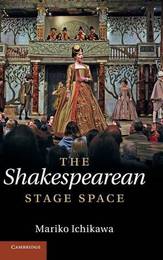
|
The Shakespearean Stage Space
Hardback
Main Details
| Title |
The Shakespearean Stage Space
|
| Authors and Contributors |
By (author) Mariko Ichikawa
|
| Physical Properties |
| Format:Hardback | | Pages:236 | | Dimensions(mm): Height 229,Width 152 |
|
| Category/Genre | Literary studies - c 1500 to c 1800 |
|---|
| ISBN/Barcode |
9781107020351
|
| Classifications | Dewey:822.33 |
|---|
| Audience | | Professional & Vocational | |
|---|
| Illustrations |
1 Tables, black and white; 6 Halftones, unspecified; 2 Line drawings, unspecified
|
|
Publishing Details |
| Publisher |
Cambridge University Press
|
| Imprint |
Cambridge University Press
|
| Publication Date |
6 December 2012 |
| Publication Country |
United Kingdom
|
Description
How did Renaissance theatre create its powerful effects with so few resources? In The Shakespearean Stage Space, Mariko Ichikawa explores the original staging of plays by Shakespeare and his contemporaries to build a new picture of the artistry of the Renaissance stage. Dealing with problematic scenes and stage directions, Ichikawa closely examines the playing conditions in early modern playhouses to reveal the ways in which the structure of the stage was used to ensure the audibility of offstage sounds, to control the visibility of characters, to convey fictional locales, to create specific moods and atmospheres and to maintain a frequently shifting balance between fictional and theatrical realities. She argues that basic theatrical terms were used in a much broader and more flexible way than we usually assume and demonstrates that, rather than imposing limitations, the bare stage of the Shakespearean theatre offered dramatists and actors a variety of imaginative possibilities.
Author Biography
Mariko Ichikawa is a professor at the University of Tohoku, Japan. Her previous publications include Staging in Shakespeare's Theatres (co-authored with Andrew Gurr, 2000) and Shakespearean Entrances (2002).
Reviews'To say that the book reaches no firm conclusions is not to disparage it: rather this uncertainty is a measure of the integrity of Ichikawa's exploration of the slippery world of early modern drama.' The Times Literary Supplement 'This is a book for those who like thinking in detail about staging questions ... Ichikawa has read an impressive number of plays from the period, and she writes with a keen sense of the limits of our knowledge of early modern stage practice. Her book is a real if modest contribution to theater studies and helps its readers think again about where on the stage Malvolio is imprisoned, how the Player King's body in Hamlet was gotten off the stage, and whether the upper stage was used for playing music before the introduction of formal music rooms.' Renaissance Quarterly
|